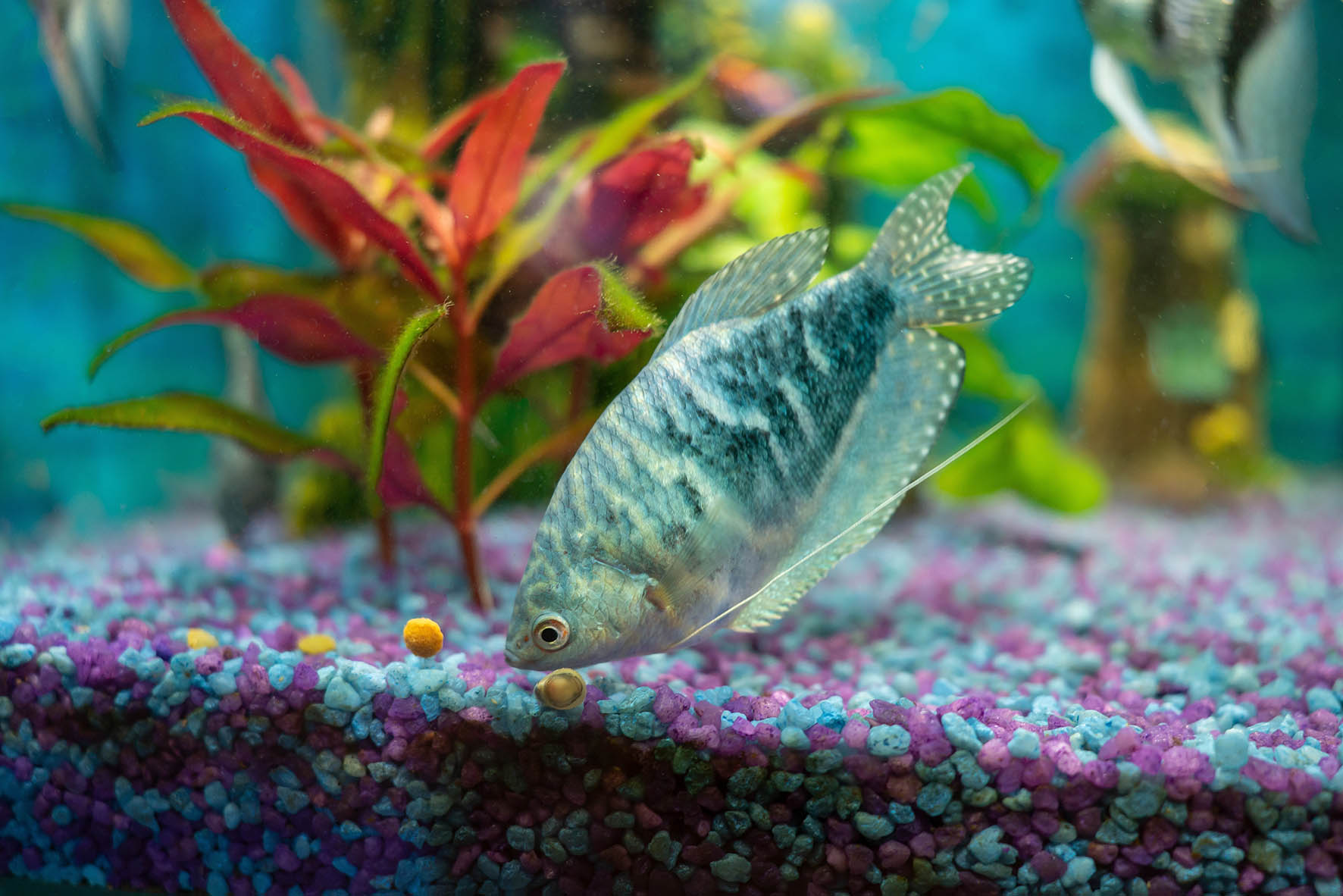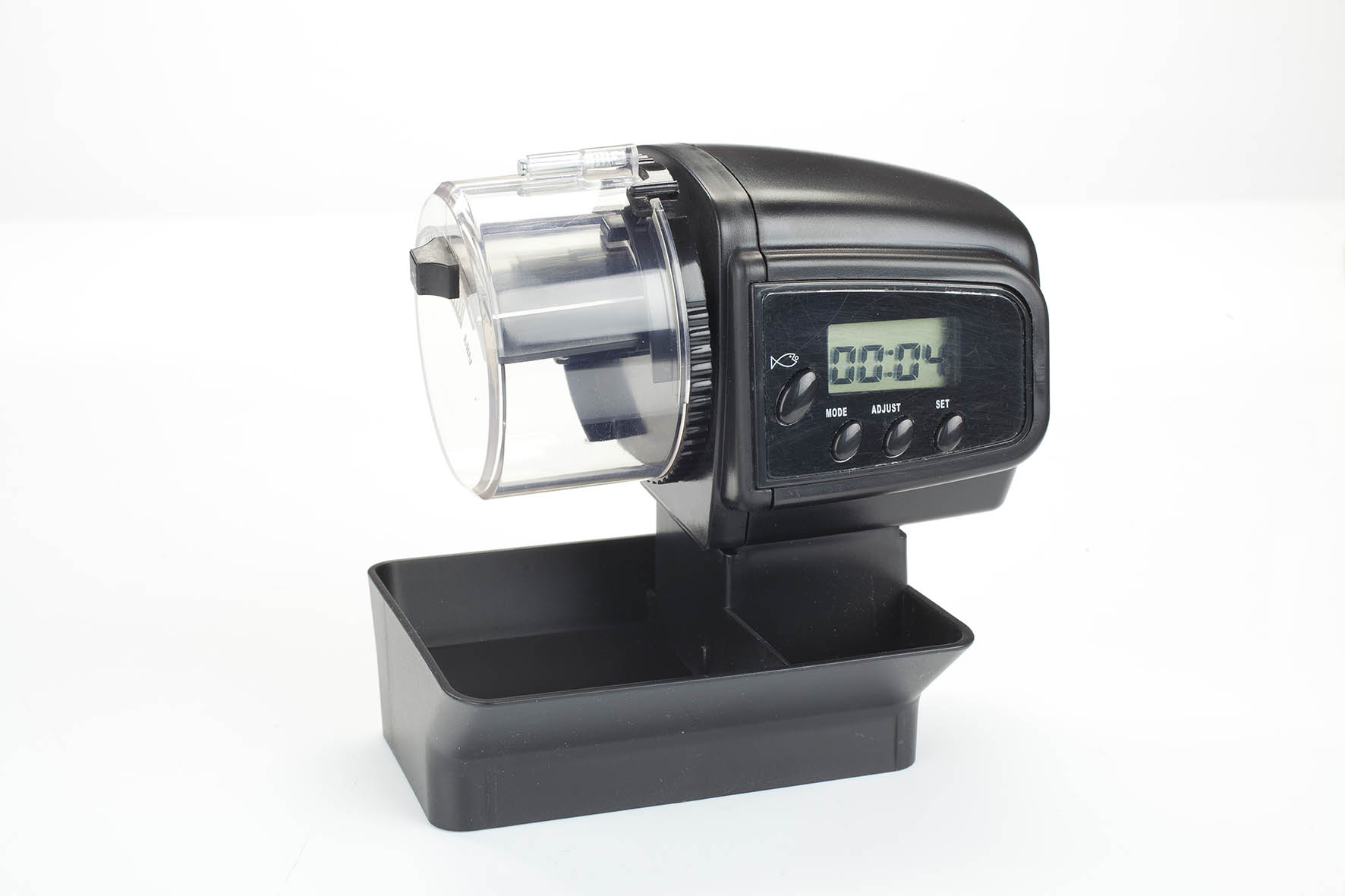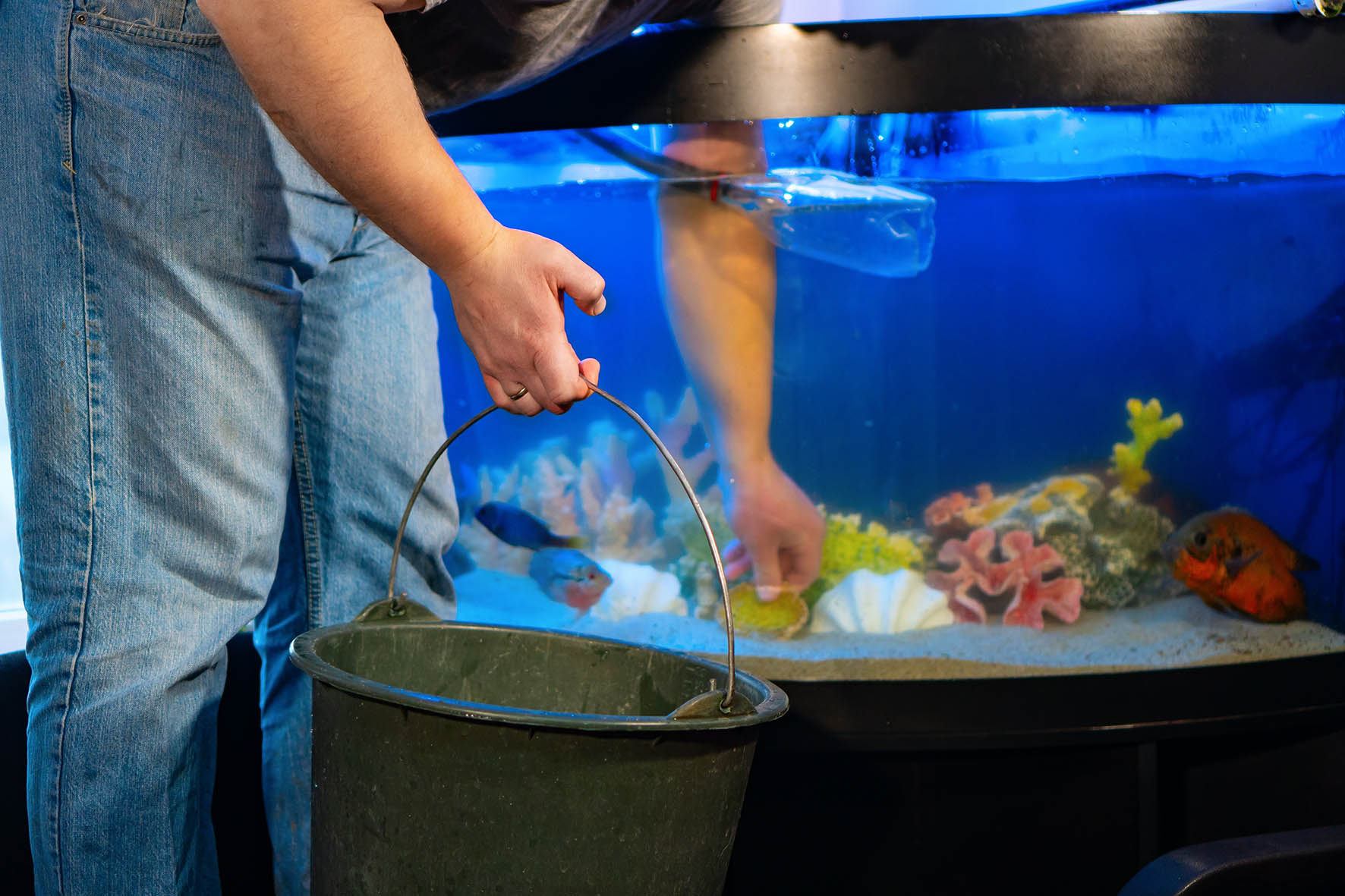Is it possible to take a holiday when you're an aquarium owner? It is if you prepare ahead of time.
Preparation, preparation, preparation. Whether it’s two weeks in the sun, or shivering in the alps, the last thing you want is to be panicking about an aquarium a thousand miles away. But simple preparation will put your mind at ease.
Ways to Feed Fish While on Holiday
The thing that aquarium keepers worry about the most is how to ensure adequate feeding while you’re away. When it comes to going away you have four options: fasting, holiday foods, automatic holiday feeders, or a fish sitter. Which of these you choose will largely depend on how long you’re planning on going away for.
1. Fasting

Fasting is the easiest option, but it does depend on what fish you have, and what the tank will be doing in your absence.
For very small species (like Boraras) or fish lacking stomachs (like pipefish) you might be able to get away with just a few days, and it might be a stretch to leave them for even a long weekend.
For big, infrequent eaters like a shovelnose catfish, a long fasting period might already be the norm—such fish will often go a week or two between meals.
Some fish might even be self-sustaining, to an extent. Algae grazing catfish might find enough nourishment to keep them going growing on rocks, plants and glass—especially if the aquarium lights are being left on a timer in your absence.
For the typical community (think mid-sized tetras, barbs, cichlids, gouramis, and so on), around five days without food isn’t going to hurt unless you have undernourished, skinny fish. If everything is plump, healthy and happy, five days is safe. Longer than this, and you’ll need to a contingency feeding plan in place.
What is important is that you avoid the temptation to feed the fish more than usual in the run up to your holiday. Extra food going in means extra waste coming out, and doing so will only increase the pollution risk in the tank.
2. Holiday Food

Holiday food varies wildly in quality and capability, and can even behave in different ways in different aquarium conditions. The white holiday blocks, for example, are designed to slowly dissolve and release pellets of food as they do. However, it does appear that some of these can dissolve rapidly in very soft water, and very slowly (or barely at all) in very hard water.
If using a classic holiday block, it’s worth trying a few different ones out many, many weeks in advance to see how they behave over the duration of your planned getaway. If they burn out in a couple of days, they’ll be no good. Likewise, if they are still solid two weeks on and the fish can’t access the food, they’ll not be for you!
More modern holiday food options include gel-based foods like those from Tetra and Dupla. These are slowly worn down as the fish graze on them, so their lifespan will depend on just how greedy your fish are. These foods tend to have a relatively low protein content, so they sustain fish without causing excessive pollution in the tank.
3. Automatic Feeders

Automatic feeders are something that many fishkeepers come to have a love/hate relationship with. When they work well, they work really well, but when they work poorly, it can be the case that they don’t really work at all.
The idea behind an automatic feeder is that you pre-fill a large chamber (or smaller individual chambers) with your choice of fish food, and then set a timer built in the device to feed every day (or more frequently, as the timer allows). The problem is that once on top of the tank, an automated feeder can be subject to moisture, it’s not unknown for the food to congeal into a solid lump inside within a couple of days, leaving your fish hungry and your food chamber fetid.
The other issues are that they can sometimes be awkward to install if you have a fitted hood, and that they can be restrictive on the types of food you can put in them.
It's worth getting to know your automated feeder well in advance, so buy it some months before your holiday and see how it behaves, and what types of food it works best with. Pellet and granule foods are usually much better than flakes or crisps for resisting the damp and turning to sludge!
4. A fish sitter

A fish sitter is the dream—someone to come in and care for your tanks in your absence—and in an ideal world it’ll be someone who knows about fish. If you’re relying on a friendly neighbour to come in for you, then show them what to do rather than just tell them. And never leave a non-aquarist with an open tub of food—your fish will be overfed to heaven and back down to hell.
One way to ensure the right amount of food is going in is to measure it out yourself ahead of time, and put each days’ worth of food into a small, sealed bag (like a sandwich bag). That way any overfeed is your fault and not your neighbour’s! Alternatively, they can come in and renew the holiday food in your tank at weekly intervals.
It’s also worth arranging for your fish sitter to visit every second or third day (unless you have fish that really can’t go without eating for 24 hours) to avoid an accidental overfeed.

Pre-holiday aquarium cleaning and maintenance
If you can ensure that you’re up to speed with your aquarium maintenance ahead of time, then when you return from your holiday, your worst woes will likely be restricted to some excess algae on glass, and maybe some dirtier than usual substrate and filter pads.
One thing you shouldn’t do is clean the tank the day before you’re set to travel. There are many risks associated with this—for one you could break something (like an impeller or impeller shaft) and not have time to replace or fix it, but secondly, you also run the risk of disturbing the tank’s ecosystem by over-cleaning the filter.
Instead, carry out a waterchange of your usual volume a week before you’re due to leave, and make sure that any mechanical filters (foams and pads) still have plenty of life in them (if they don’t spring back to their original shape after a firm squeeze, they’re on the way out).
As long as the tank isn’t overfed in your absence, and as long as the tank isn’t overstocked for the filter you have, it will cope fine for a fortnight.

Can I automate my aquarium for my holiday?
If you have an aquascape, or just a tank full of plants, the problem remains: light on, or lights off? Left on, you run the risk of coming back to an algae nightmare, while the lights left off may see your weakest plants shrivelling right back or dying off.
If your lights don’t have built-in controls, the easy fix is to get a plug-in timer. If you don’t have plants at all, then it’s easier just to leave the tank in the dark for your holiday—aquarium lighting is very much for our benefit rather than the fishes’, and your livestock will be more than happy with just ambient light.
Another worry when away is whether water quality and water chemistry is doing what it should be doing. For peace of mind, it would be prudent to invest in a real-time monitor like the Seneye. While a Seneye doesn’t cover everything, it will at least keep you remotely advised as to ammonia levels, pH, temperature, and whether the tank still has water in it!

Should I stock up on aquarium medications for a holiday?
Whether you have a relatively new tank, or a long established one, a good rule is to avoid adding any new fish to your tank in the weeks running up to your holiday. This way you will eliminate any risk of introducing diseases like whitespot.
However, your tank isn’t immune to problems, and you can still experience some diseases—especially finrot or Saprolegnia—if the fish nip each other, or snag themselves on sharp objects, and infection sets in.
Consider a good, generic medication that your fish sitter can use in your absence—I’d advise either NT Labs Disease Solve or Interpet Disease Away+—and keep it somewhere accessible with details of exactly how much to dose, how often, and whether anything else needs to be taken into consideration (carbon, for example, will need to be removed from a filter before starting a course of treatment). If your fish sitter reports a poorly looking fish, ask for a photograph, and if you see frayed fins or furry bits, get them to run a course of treatment for you.
Also, if you don’t have some already, purchase a fresh bottle of biological filter supplement like Seachem Stability, or Aquarium Systems One and Only. If there’s a powercut, or if the filter stops for a while when you’re away, your fish sitter will be able to add some to help keep the filter plodding along until your return.

How to care for an aquarium after a holiday
Once you’re back with your beloved fish, you might be tempted to reach straight for the tubs of food, but show some restraint.
Before you do anything else, test for ammonia and nitrite—if overfeeding has occurred in your absence, either or both of these pollutants will test at elevated levels and will need fixing.
It’s also worth having a look at the pH and hardness of the water on your return, as an overfed and unmaintained aquarium may experience unusually soft and acidic conditions.
Next, have a good look through your tank, exploring any nooks and crannies. In the first instance, you’re looking for any dead fish, but if you’ve used a holiday food then you’ll also need to see if there’s any left that needs to come out. After a week or two of being nudged about, the holiday food won’t be where you initially placed it!
Another important job is to conduct a partial waterchange (the amount you’d normally take out will be fine) and get your filters cleaned up, paying extra attention to any foam pads that may be clogged. Even if the filter is flowing, the pads may be squashed down inside, with water flowing around them.
Lastly, if you've used one, make sure to reward your fish sitter generously for looking after your fish. Non-fishkeepers are extremely nervous about messing things up in a tank, and if their first fish-sitting experience is stressful, they’re likely to find any excuse not to do it again. A quality fish sitter is a valuable commodity!
Can I hire a professional to look after my tank?
There are now many aquarium maintenance services around the country, who typically install and maintain tanks. Some may also extend to a short ‘holiday only’ contract, and will come in to look after all aspects of your tank in your absence—and even those who don’t offer holiday care as standard will usually be happy to negotiate a holiday package.
It’ll certainly cost more than using a neighbour in the short term, but in the long run it could be saving you hundreds of pounds on your livestock if something was to go wrong that a fish sitter didn't understand.

Train your fish sitter how to clean an impeller
One potential disaster in your absence would be a clogged and dirty impeller, and it is heartily advised to teach your fish sitter how to access it, remove it, clean it, and replace it.
Take the opportunity at the same time to show your fish sitter how to access any carbon inside the filter. If they do need to treat for something, they can remove this beforehand.

Is a Polyfilter helpful for a holiday?
If you have a fish sitter, consider purchasing an Arcadia Polyfilter for emergencies. With its far-reaching chemical filtration abilities, it is a godsend to simply drop into a tank in the event of an undiagnosable problem. A mystery death, discoloured water, oddly behaving fish—the Polyfilter is a go-to for a range of unconventional problems.

Holiday foods: Our recommendation
Our own choice of holiday food comes down to three: Tetra TetraMin Holiday, Fluval Bug Bites Holiday Food, and Dupla Gel-O-Drops Holiday. These will comfortably feed a tank for a seven-day period, but if you’re away for longer, then you’ll need someone to add more.

Automatic feeders: Our recommendation
Our preferred automated feeder remains an old design that still works: The Fish Mate F14. With food loaded into individual ‘pie slots’, I’ve always found that it reliably feeds over a two-week period, with varying amounts of damp getting inside.







